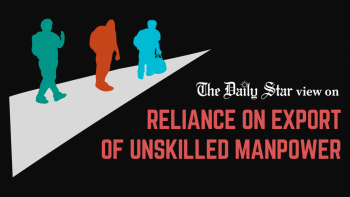We must protect vulnerable migrants

It breaks our heart to see the desperation that continues to push a large number of migrants to undertake perilous journeys in search of a better livelihood. A recent report by this paper sheds light on the horrors facing these people, especially those seeking passage to Europe via Libya, their journey often marred by captivity, extortion, torture, and starvation. The statistics are staggering: a shocking 63.2 percent of undocumented Bangladeshi migrant workers in Libya, according to BRAC's Migration Programme, were held captive in torture camps. BRAC interviewed 629 survivors who were rescued and repatriated to Bangladesh in 2022. Of them, 557 were from Libya alone.
The North African country, despite having a formal agreement on labour migration with Bangladesh since October, continues to attract droves of people trying to reach Europe illegally. There are many who harbour no such intention but still end up with the same harrowing experiences. The cycle of exploitation begins at home, with agents of trafficking networks reportedly more active in areas like Faridpur, Cumilla, and Noakhali, luring individuals with promises of lucrative job opportunities. Once in Libya, most are kept in detention camps, tortured, and their families extorted for exorbitant sums of money. The exploitation doesn't end there, however, especially for Europe-bound workers, as hundreds perish during treacherous boat journeys across the Mediterranean.
As of February 22, some 1,722 people were repatriated from Libya to Bangladesh just over the past one year, according to airport and immigration data. According to a report, the government brought back 144 more irregular migrants from Libya on February 23. The question is, why does this cycle keep repeating itself? While the desperation of overseas jobseekers is largely to blame, there are a number of other contributing factors. Among them are the lack of conviction in trafficking cases, unchecked operation of unscrupulous recruiting agents, lack of awareness, and lack of effectiveness of existing anti-trafficking initiatives.
In the face of the immense suffering caused by this situation, it is imperative that the government takes meaningful steps to address it. First and foremost, there must be enhanced collaboration with labour-receiving countries to dismantle trafficking networks and hold perpetrators accountable. Law enforcement agencies must prioritise the investigation and prosecution of human traffickers, providing avenues for survivors to seek justice. Moreover, efforts must be made to tackle the root causes driving migration, including poverty, lack of economic opportunities, and political instability. The authorities must also undertake regular awareness campaigns to educate people about the danger of illegal migration.


 For all latest news, follow The Daily Star's Google News channel.
For all latest news, follow The Daily Star's Google News channel. 









Comments